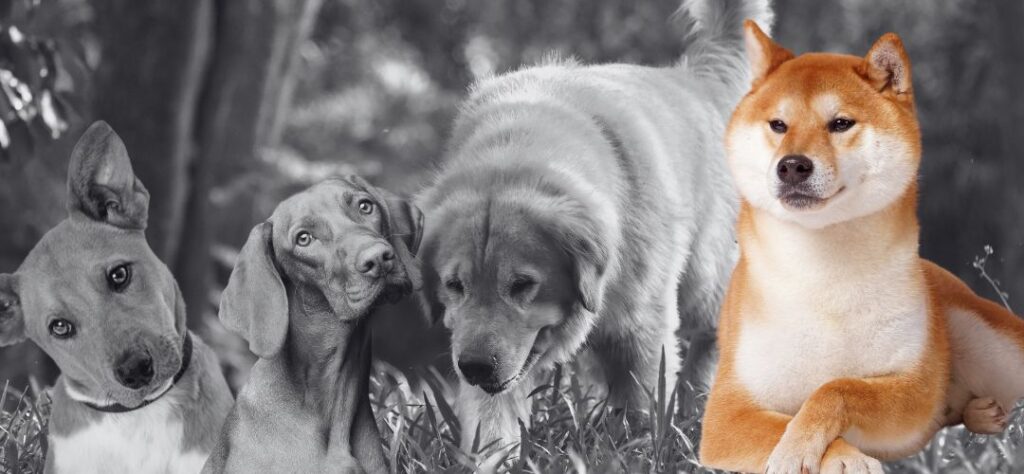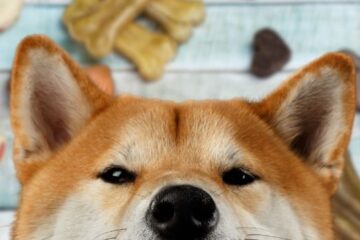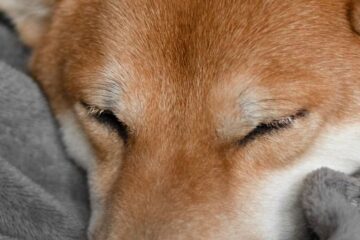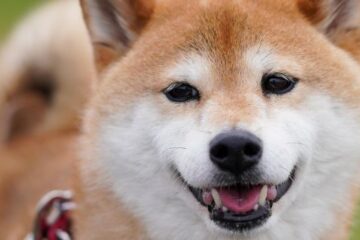Are Shibas good with other dogs? | Introducing the million dollar question: “Are Shibas good with other dogs?” It’s a question that’s got dog owners debating around the world – and for good reason! After all, it can make or break a lot of important decisions. Do you bring your Shiba along on playdates with your pup pals? Should you take the plunge and adopt another furry friend into your home? Read on to find out if Shibas are indeed good with other dogs. Spoiler alert: you just might be surprised at what we found out!
The truth is, Shibas can get along with other dogs – but just like any breed, it really all depends on the individual dog’s personality and past experiences. Some Shibas may be perfectly content to chill out with their canine pals at home or while out on a walk, while others may prefer to keep their distance from the pack. That said, it’s important to remember that you should always introduce your Shiba slowly and cautiously when meeting new dogs; this will help prevent potential negative interactions. Additionally, make sure to supervise any group activities closely, especially if there are puppies or young dogs involved who might not know how to play nicely yet!
So if you’re looking for an answer as to whether Shibas are good with other dogs, the answer is a big, furry-tailed “maybe!” Ultimately, it’s up to you as an owner to make sure your pup is comfortable and happy in any social situation. With a bit of patience (and maybe a few treats) you can help foster strong relationships between your four-legged friend and their canine companions; who knows – they might even end up being best friends!

How do you introduce a Shiba Inu to a new dog?
Introducing a Shiba Inu to a new dog can be an exciting but also nerve-wracking experience. It’s important that you take your time with the process, as both dogs could end up feeling overwhelmed if it’s rushed. Here are some tips to help make the introduction as smooth and stress-free as possible:
First, make sure your Shiba has had plenty of physical and mental stimulation before meeting their new friend. This will help ensure they have relaxed energy when greeting the other dog. Additionally, introduce them in neutral territory – for instance, going to a park or beach neither dog has visited before is ideal.
When actually introducing the two dogs, start by having them on leash at least six to eight feet apart and slowly let them get closer until they can sniff each other’s noses. If one or both dogs seem uncomfortable or anxious, move them further away and take a break from the meet-and-greet for a few minutes before trying again.
Give both dogs plenty of praise and treats while they’re getting acquainted – this will help create positive associations with the new dog. Make sure to check their body language throughout; if either dog starts backing away, becomes stiff, raises its hackles, vocalizes aggressively, etc., then separate them immediately as this could be an indication of discomfort or stress.
Finally, it’s important to remember that introductions usually don’t go perfectly right off the bat! It may take multiple outings and meetings before the two dogs are comfortable with each other, so don’t be discouraged if it doesn’t happen in one go. With patience, consistency, and positive reinforcement, your Shiba Inu will likely become good friends with their new furry companion. Good luck!
Is a Shiba Inu a wolf dog?
No, a Shiba Inu is not a wolf dog. Shibas are classified as a domesticated breed of dog and are descendants of ancient Japanese dogs from the 6th century BC. They have been bred exclusively for companionship since then. Although they may share some physical traits with wolves, they lack the strong predatory instincts that true wolf-dog hybrids possess. In addition, if your Shiba has any wolf-like behavior such as barking and howling excessively, chasing smaller animals, or digging large holes in the yard – these could all be indications of separation anxiety which can be managed with appropriate training and attention.
Are Shiba Inus like Akitas?
Shiba Inus and Akitas are both native to Japan and classified as spitz-type breeds, but that’s about where their similarities end. Akitas (or “Akita Inu” as they are sometimes referred to) are larger, more powerfully built animals than Shibas – typically standing between 24–28 inches tall compared to the 16–17 inches of a Shiba – and possess an independent streak which makes them notoriously difficult to train. Furthermore, whereas Shibas have been bred mainly for companionship over the centuries, Akitas were originally used by hunters to track game or hunt boar.
In terms of temperament, Shiba Inus tend to be cheerful, outgoing dogs who quickly learn commands and are eager to please their owners. Akitas, on the other hand, are more aloof and sometimes shy around strangers – making them better suited for experienced dog owners who can appreciate their loyalty but understand that they need space at times.
Both breeds share a strong prey drive, so it’s important for owners of either breed to be aware that small animals or birds may not be safe around them. That said, both Shibas and Akitas can make wonderful companions with the right training and socialization. If you’re considering adding one of these two breeds to your family, do some research first to make sure they will fit into your lifestyle! With patience, consi stency , and positive reinforcement , you can have a loving, loyal pet no matter which breed you choose.
In short, Shiba Inus and Akitas may both be spitz-type breeds from Japan but they’re quite different in terms of size, temperament and behavior. That said, with the right training and socialization they can make great additions to the family. Do some research first to ensure that you’ll end up with a canine companion who will suit your lifestyle!
Are two Shibas better than one?
When it comes to deciding whether or not two Shibas are better than one, the answer is decidedly subjective. Some pet owners may prefer the companionship of having multiple dogs, while others might feel overwhelmed at the thought of taking on two canine pals instead of just one.
On the plus side, having two Shibas means double the cuteness! Watching them play together can be incredibly rewarding – they’re known for being quite athletic and agile, so playing fetch or chasing a frisbee can provide hours of entertainment. Furthermore, they rarely bark excessively and tend to get along with other pets in a household more easily when there are two of them.
That said, there are also some drawbacks to owning two Shibas instead of just one. These little dogs are pack animals, so if they’re not properly socialized when young, they can become territorial and start fighting with each other. This is particularly true in households where there isn’t enough space for both pups to roam without stepping on each other’s toes. Additionally, two Shibas will require double the amount of attention – feeding, grooming and training them both takes a considerable amount of time and effort.
Ultimately, it all comes down to individual preference – if you have the resources and patience to care for two Shiba Inus, then two might be better than one! However, if your lifestyle won’t allow for it or you don’t think you can handle the extra responsibility, then sticking with a single pup is your best bet. Whichever direction you decide to take, always remember that these dogs are loyal, loving companions who will suit your lifestyle accordingly! Good luck in finding the perfect Shiba for you and your family.
How do you bond with a Shiba Inu?
Bonding with a Shiba Inu can be an incredibly rewarding experience. These dogs are very intelligent and loyal, so they make wonderful companions if given the right kind of guidance. Here are some tips for how to start building a strong and healthy bond with your pup:
1) Spend Quality Time Together
Nothing strengthens the bond between pet and owner like regular one on one time! Make sure you actively engage with your Shiba every day by providing plenty of mental stimulation activities such as playing fetch or teaching them new tricks. Additionally, spend at least 15 minutes each day just snuggling together – this will help to create a sense of security in both you and your pup.
2) Investigate Their Habits
Spend some time observing your Shiba Inu and learning about their individual habits. Not all Shibas are the same, so it is important to take note of your pup’s preferences and adjust accordingly. For example, if they love going for walks in the morning then make sure you plan ahead and set aside plenty of time for this activity.
3) Play Fun Games
Playing games with your Shiba is a great way to bond and have fun together at the same time! Try teaching them how to fetch or hide treats around the house, which encourages problem-solving skills while also keeping them engaged. Additionally, try agility courses or puzzles which keep their mind active and help build trust between you both.
4) Stay Patient
As with any pet, patience is key. Shiba Inus are highly intelligent and can pick up commands quickly but they don’t always do things exactly the way you want them to. Be consistent in your training and always remember to use positive reinforcement whenever possible. It may take a bit longer for them to learn but it will be worth it in the end!
5) Are Shibas Good With Other Dogs?
Yes, as long as proper introductions are done! Make sure your pup is properly socialized before introducing them to other dogs by slowly introducing them to different environments, such as dog parks or playdates at friends’ homes. Additionally, try enrolling them in puppy classes or dog obedience classes – this helps to ensure that they learn how to interact with other dogs in a safe and structured environment.
Why is my Shiba Inu so aggressive towards other dogs?
Shiba Inus are generally considered to be an independent, spirited breed. They can often show aggressive behavior towards unfamiliar dogs, and this may be due to their territorial instinct or because of a lack of socialization when they were younger. It is important to remember that aggression in dogs is not usually caused by one single thing; rather, it is the result of multiple influences such as genetics, environment, and training.
If your Shiba Inu has been displaying signs of aggression towards other dogs, the first step should be to determine why this behavior is occurring. Is your pup feeling anxious or threatened? Is he trying to protect his territory? If so, you will need to create a calm and secure environment for him at home. Try to reduce any potential stressors such as loud noises, unfamiliar visitors or the presence of other animals.
It is also important to provide proper socialization opportunities for your pet. Start by introducing him to one dog at a time in a secure location, and make sure that both pets are supervised and have plenty of space. If you notice signs of aggression, try distracting them with toys or treats and avoid using physical punishment. Positive reinforcement techniques can help create positive associations with meeting new dogs.
You should also consult professional trainers who specialize in aggressive behavior for additional tips and advice on how to manage your pup’s aggression towards other dogs. With patience, consistency and the right guidance, it is possible to teach Shiba Inus to be good with other dogs and even enjoy their company.
Conclusion | Are Shibas good with other dogs?
Shiba Inus are known for their independent nature and strong-willed personality, and as such may demonstrate aggression towards other dogs. This behavior can be the result of territorial instinct or a lack of socialization when they were young, so it is important to figure out why this aggression is occurring. The first step should be to create a secure environment for them at home with reduced stressors. Proper socialization opportunities should also be provided; introducing them to one dog at a time in a secure location while being supervised, avoiding physical punishment, and using positive reinforcement techniques can help create positive associations with meeting new dogs.
Lastly, professional trainers who specialize in aggressive behavior should be consulted to get additional tips and advice on managing the pup’s aggression. With patience, consistency and the right guidance, it is possible to teach Shiba Inus to be good with other dogs and even enjoy their company. It may take some time for them to feel comfortable around other canines, but with the right steps and techniques in place it’s only a matter of time before they are happily playing along with their canine friends.


